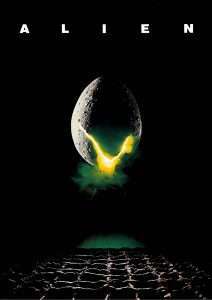Ellen Ripley, Action Hero
When Alien and Ellen Ripley, played by Sigourney Weaver, first hit cinema screens in 1979, Ridley Scott’s slow-burn space horror, culminating in the infamous chest-burster scene, had cinemagoers scrambling for the escape pods [1]. Alien and Ripley were a massive hit: the character starred in three more Alien films, as well as appearing in novels and video games. Now, more than 45 years later, Ripley remains a cultural icon and is considered one of the first female action heroes in Western cinema [2]. For this article, I’m looking at what makes Ripley a feminist icon and the most important female action hero of late twentieth century cinema.
 Femininity and Feminism
Femininity and FeminismCritics often undermine female action heroes, including Ripley, by claiming they lack femininity, and suggesting that women can only be action heroes under ‘exceptional circumstances’ like mental illness or maternal instinct. This overlooks the fact that male heroes are formed in the same ways and, even those who are driven by paternal instincts, this is never questioned. This sort of criticism also relies on upholding outdated gender roles and critics decrying female heroes as not ‘real women’ has the effect of discouraging female audiences from believing they too can be strong and independent. Ripley has not only been criticised for being unfeminine but also for failing to perform certain types of feminism. In the essay “Is Ellen Ripley a feminist?” [3], the character is deemed to fall short as a feminist because she doesn’t perform an excessively mothering, or caregiving, role. The essayist claimed Ripley only demonstrated these care focused ethics in her interactions with Newt. This fails to take into account Ripley’s consistent protective behaviour towards various vulnerable characters throughout the series. Her focus transcends individual identities, emphasising mutual survival in adversity and echoing the principles of intersectional feminism that highlight the vulnerability of the others [4]. She’s plenty feminist in my books.
With all the above in mind, Ripley is important not only for her role as a female action hero but also in the destabilising effect she had on gender roles in action cinema [5]. Ripley’s evolution expanded the definition women’s experiences in the late 20th century, creating space for other heroines to emerge. It seems progress in cinema requires the disruption of existing norms.
Anticapitalism“Priority one
Insure return of organism for analysis.
All other considerations secondary.
Crew expendable.”
Long-time fans of the series will recognise the directive sent to the Nostromo in Alien. Special Order 937 demonstrates Weyland-Yutani’s priority of profit over personnel, which is a common feature of capitalist corporations. Something, I’m sure, we’re all aware of in this day and age.
Ripley puts the lives of her crew (and humanity at large) above the interests of Weyland-Yutani and strongly believes that the xenomorph must be kept away from the company and the rest of humankind. She knows they want to weaponise the alien for profit and while her primary concern is to protect others, she also works to disrupt the capitalist aims of Weyland-Yutani, making her an anti-capitalist hero.
“I don’t know which species is worse; you don’t see them fucking each other over for a goddamn percentage!”
Ripley, to Burke, Aliens
While there are examples of this anti-capitalist heroism in all four films, Ripley’s interactions with Carter Burke in Aliens definitely stand out. Burke goes to great lengths to stress the financial value of company assets in the film, citing “substantial dollar value” and the “multi-million dollar installation” in objection to Ripley suggesting the entire site of LV-426 should be destroyed from orbit. He also tries to convince Ripley to save a specimen because it would be “worth millions to the bioweapons division” and to do so would mean “we’d be set for life”. Despite his attempts to sway her with the prospect of a massive payday, Ripley rejects Burke’s ideas in favour of saving the lives of the colonists, marines and getting justice for those who have been killed.
 Ripley Recurring
Ripley RecurringWhen something works well we like to take that core recipe and repeat it, in the hope that we can recreate the magic we so enjoyed first time around. With Ripley we can see this both within and outside of the wider Alien franchise. Elizabeth Shaw (Prometheus), Daniels (Alien: Covenant) and Rain (Alien: Romulus) all have striking similarities to Ripley. All resemble Ripley physically and in their character progression: none are initially in positions of leadership; and all three end up having to find extraordinary strength and resilience not previously expected of them to survive. With Daniels, the comparisons are even deeper as she is—like Ripley—third in command, whose superiors die during the film. The promotional poster for Alien: Covenant closely echoes the image of Ripley in Aliens heading into the nest to rescue Newt. An image that also recurs in Alien: Romulus as Rain exits an elevator shaft gripping a pulse rifle, in search of her brother, Andy. With Alien: Earth coming this summer to streaming platforms, how will Ripley’s essence be represented this time around?
We don’t have to look far outside the Alien franchise to see the effects of Ripley’s success as a female action hero. Roles played by Milla Jovovich, for example, have followed Ripley’s path; Leeloo (The Fifth Element) and Alice (Resident Evil franchise) are both key as action heroes. How about Laurie Strode in the Halloween series, Sarah Connor from the Terminator films, and Furiosa of the newer Mad Max films? Where would they be without Ripley’s pioneering rise to action hero stardom? Even some of Weaver’s own roles outside of the Alien-verse also strike the image of a Ripley-esque, formidable woman, e.g., The Cabin in the Woods, Avatar or Rakka. Weaver has even reprised Ripley for the videogame Alien: Isolation as a voice-over artist.
Without the appearance and repeated success of the Ellen Ripley character, it may have been several more years before a female action hero was able to break through the boundaries of a traditionally male character type to allow for others to follow [6]. Without Ripley’s success proving that women can be action heroes and still attract revenue we may never have seen the likes of Leeloo, Alice, Laurie, Sarah or Furiosa [7].
Ellen Ripley is an iconic, gold-standard [8] badass [9], ‘the first action heroine’ [2], and a ‘boundary-busting’ feminist icon [6] to this day. Her longevity and continued relevance are testament to her strength as a character, and to her importance in cinema. She is a role model to many for her bravery and strength and is difficult to contain within one single set of rules or definitions. She can effectively wield a flamethrower and comfort an orphaned child; confusing both critics who would write her off as too manly and those who would complain she is too motherly and soft. Ripley’s impressive footprint in sci-fi history raises her to the status of legend and qualifies her to be counted among our grimdark ilk. Her many successes cement her as the most important female action hero of the late twentieth century, and long may it continue.
This article was first published in Grimdark Magazine Issue #42
References:[1] The Beast Within: The Making of Alien, 2003
[2] Brooks, X. (2009) The First Action Heroine. The Guardian, 13 October. Available at: https://www.theguardian.com/film/2009....
[3] Christian, A. (2017) “Is Ellen Ripley a Feminist?” In Ewing, J., Decker, K.S. and Irwin, W. (eds.) Alien and Philosophy: I infest, therefore I am. Hoboken; Chichester: John Wiley & Sons, Ltd. pp. 166–177.
[4] Cho, S., Crenshaw, K.W. and McCall, L. (2013) Toward a Field of Intersectionality Studies: Theory, Applications, and Praxis. Signs, 38 (4): 785–810. Available at: http://www.jstor.com/stable/10.1086/6....
[5] Purse, L. (2011) Contemporary Action Cinema. Edinburgh: Edinburgh University Press.
[6] Erbland, K. (2017) ‘Alien’ Revisited: Nearly Four Decades Later, Ripley Is Still the Boundary-Busting Heroine We Deserve. IndieWire, May. Available at: https://www.indiewire.com/2017/05/ali....
[7] Sullivan, S. (2020) The Alien Franchise and Feminism. Medium.com, September. Available at: https://medium.com/feature-presentati...
[8] Williamson, J.L. (2017) Ellen Ripley, Alien, and the Rise of the Modern Ripleys. Available at: https://www.denofgeek.com/movies/elle...
[9] Marceau, C. (2020) Greatest Feminist Icons in Horror #12: Ellen Ripley. Tilt Magazine, October. Available at: https://tiltmagazine.net/film/greates...
The post Ellen Ripley, Action Hero appeared first on Grimdark Magazine.



